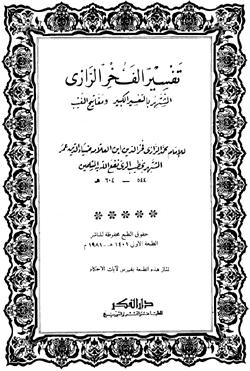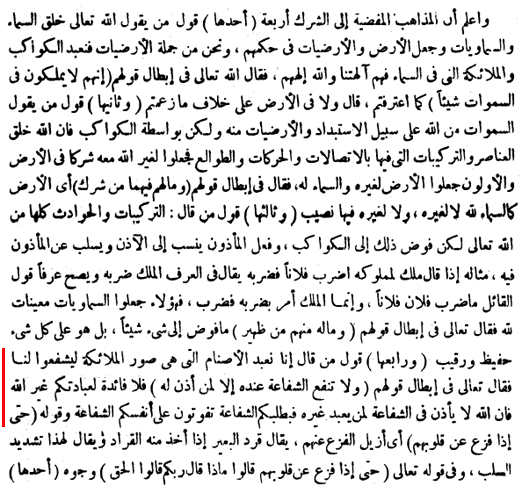| Monday, 26 January 2026 Home • About Us • Contact Us |
 | |
|
|
|
You are here:
Home /
Topics
/
Shafaa'ah
Mail to a Friend • Printer friendly 
Background and Introduction
Historically, the innovations of the first century were light innovations (Khawarij, Shi'ah, Qadariyyah, Murji'ah), in that they did not directly relate to Allaah Himself. Those that came in the second century hijrah were more severe in that they related directly to the belief in Allaah Himself (His Names, Attributes, His Uluww, His Speech), and then from this period the introduction of philosophy and gnosticism (mystical esoteric knowledge) led to further deviations. However, it took around six centuries for shirk (associationism) to spread amongst the Muslims on a wide scale. The seeds of this shirk were spread initially by the Ismaa'eelee Baatiniyyah known as Ikhwan al-Safaa (Brethren of Purity) in the third and fourth centuries, and they were given support by the Ubaidiyyah (Shii'ite rulers of Egypt) when they took power. Prior to this time (before the fifth century, i.e. 400H), whilst the variuos sects had deviations in issues of aqidah, the understanding of Tawhid al-Ibaadah was still relatively firm.
This shows that the greater deviations occurred when the people were further away from the era of revelation, and this is simply a cycle of history. This has always occurred after the sending of Prophets and Messengers, and it is indicated in the Prophetic texts for this ummah, such as those texts that mention that this (Muslim) nation will follow the footsteps of those (nations) that came before them (such as the Jews and Christians). For this reason, the greatest deviation, shirk with Allaah, was the last of the affairs to enter into the Ummah - long after the era of Prophethood.
Coming to the subject of this series of articles now, we present in this some quotations from the Tafseer of ar-Razi pertaining to the core arguments for the justification of supplicating to those besides Allaah and seeking their intercession, and through this we illustrate that this type of refutation against the grave and saint worshippers precedes Ibn Taymiyyah (rahimahullaah) by a century and Ibn Abdul-Wahhaab (rahimahullaah) by six centuries, and it also uncovers the academic and intellectual fraud of today's grave and saint-worshippers against the Scholars of Tawheed.
Recap Of What Has Preceded
We have established previously that al-Razi, the Ash'ari scholar of the 6th and early 7th centuries, affirmed: a) That shafaa'ah (intercession) belongs to none but Allaah alone, and intercession can never take place except with Allah's permission - (see this article), b) That du'a (supplication) is the loftiest of the stations of al-ubudiyyah (servitude, worship), is the most excellent of the types of worship, and the reality of du'a is such that incorporates other forms of worship such as humility (dhull), servitude (uboodiyyah), incapacity (inkisaar), poverty, need (maskanah) - (see this article), c) That none of the pagans ever intended to worship the statues or idols, rather the acts of worship they performed were directed to those in the graves, and their reason was that they were intending to solicit their intercession - (see this article and this article), d) That many were found in the time of al-Razi who flocked to the graves and venerated them with the desire of soliciting the intercession of the righteous dead - (see here), e) That no nation in history ever believed in Ruboobiyyah for other than Allaah (with an exception for the Dualists) and that none of those who worship other than Allaah believe that what they worship has any independent power or control. And that what actually led people to worship things were certain philosophical and other reasons and from them were the soliciting of the intercession of the pious, righteous dead. And further, that whatever they took as focal points of worship (pictures, idols, statues, graves, tombs) were never intended for worship at all, rather they were simply focal points to allow the direction of worship to the righteous dead - (see here) Seeking shafaa'ah From Other Than Allaah Prevents You From Receiving shafaa'ah At All There is another statement of al-Razi that is of interest to us and it occurs in his tafseer of the verse in Surah al-Saba (34:22-23), and actually have an entire article on that subject with excellent commentary from Ibn al-Qayyim (see here). Al-Razi has a sentence or two of interest in his commentary on this verse. It occurs in his Mafaateeh al-Ghayb (25/255-256):
Before we translate the part of interest, al-Razi explains that the madhhabs (ways) that lead to shirk are four in number. He explains three of them which are centered around doubts pertaining to the Angels, celestial bodies, stars and planets and in which the pagans wrongly believed that they were given ownership or control over parts of the universe, or the events taking place therein. Then he mentions the fourth, where he says:
This statement here is something in which al-Razi preceded Ibn Taymiyyah and Ibn Abdal Wahhaab. You have to remember what has preceded in these articles that al-Razi considers du'aa to be from the greatest form of worship. And that intercession belongs only to Allaah and is asked only from Him. And that a people began to worship the righteous dead (Prophets and otherwise) seeking intercession from them. And that this is the false worship that is forbidden and which constitutes shirk. So here, when he says that by soliciting and requesting shafaa'ah from other than Allaah, they actually relinquish the shafaa'ah from themselves, and this means that they have fallen into shirk, since shafaa'ah is only for the Ummah of Muhammad, meaning those who are upon Tawhid and die upon that. And from this Tawhid is to solicit shafaa'ah only from Allaah in that you say "O Allaah allow the Prophet to intercede for me with You", this is what the Sunnah has come with and this is supplicating [which is worship] only to Allaah, with the firm belief that all shafaa'ah is in His control alone, and asking Allaah, to accept the Prophet as an intercessor for the one supplicating.
Closing Note As we have stated in earlier articles, if you take all of these statements of al-Razi, essentially you have got the first half of the book, Kashf al-Shubuhaat of Shaykh al-Islaam Ibn Abd al-Wahhaab. It's actually identical more or less, and al-Razi preceded Ibn Abd al-Wahhab by around six centuries!
Link to this article: Show: HTML Link • Full Link • Short Link Related Articles:
You must be registered and logged in to comment. |
|
|
© TawhidFirst.Com. All rights reserved.
|
 To the right is a cover page for the book "Tafsir ar-Razi", also known as "Mafaateeh al-Ghayb" belonging to
To the right is a cover page for the book "Tafsir ar-Razi", also known as "Mafaateeh al-Ghayb" belonging to 
 The fourth of them: The saying of the one who said, "We
The fourth of them: The saying of the one who said, "We